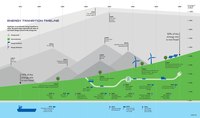
Photo from wikipedia
This paper problematizes the uneven nature of low carbon energy transitions in the context of uneven geographical development and core/periphery asymmetries. It explores the impacts of transition for peripheral communities… Click to show full abstract
This paper problematizes the uneven nature of low carbon energy transitions in the context of uneven geographical development and core/periphery asymmetries. It explores the impacts of transition for peripheral communities lacking political power and agglomerative advantages. While decentralised developments that emerge with energy transition promise to bring new opportunities to remote areas, factors of economic and political inequalities render those opportunities socially and spatially segregated. Exploring experiences of rural and exurban communities in South Wales, the paper establishes links between low carbon transition and its actually existing implications on the ground. It demonstrates that even if having an abundance of natural resource and physical space to harness low carbon energy, many rural communities are trapped in the chronic positions of energy peripheralization.
Journal Title: Energy Policy
Year Published: 2020
Link to full text (if available)
Share on Social Media: Sign Up to like & get
recommendations!